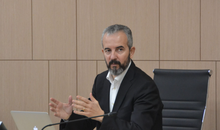
 Flash News
Flash News
A stable in Fier is engulfed in flames, agricultural equipment and haystacks are burned
Taulant Xhaka is introduced as a player-coach of the Albanian team in Switzerland
Iranian Foreign Minister Admits Serious Damage to Nuclear Power Plants
He bought votes for his daughter, SPAK takes the father of the PSD candidate to trial
Russia prepares summer offensive with help from North Korean troops in Ukraine
Reproductive health law, surrogacy experts: There must be very strong criteria!

In Albania, the Ministry of Health has recently submitted for public consultation a draft law on sexual and reproductive health. The project has sparked debates over several innovations related to medically assisted reproductive therapy procedures, which are currently not fully regulated by law. Professionals in the field of medicine say for the Voice of America that the draft law has shortcomings and does not deal in depth with the problems related to the fetus and the mother. A very controversial moment is related to the involvement of the surrogate mother.
Representatives of the health system and experts on social developments in the country are raising concerns about the draft law on sexual and reproductive health. The obstetrician-gynecologist, Astrit Bimbashi, tells the Voice of America that together with a wide group of doctors, they were waiting for legal regulations for assisted medical reproduction therapy. For 20 years, there has been no control in this field, he says, while adding that even this draft law leaves a lot of ambiguity.
"The draft law is deficient because it does not mention social, psychological or economic incentives, so nothing. It is simply allowed or forbidden. The inclusion of the term sexual and reproductive has manipulated those who made this law, to call reproduction as assisted reproductive therapy. I think that the word "sexual" in the name of the bill should be removed and the reproductive health law should remain, which has several basic points: pre-reproduction, reproduction and post-reproduction, adolescence, the mother who gives birth to a baby from 0-6 years old, as well as post-reproduction menopause until the woman's death. But to make 7 pages about reproductive medical therapy and leave with three lines a major problem in Albania which is feto-maternal health, we don't think it's right" - argues Astrit Bimbashi, obstetrician-gynecologist.
The inclusion in the bill of a woman's right to become a surrogate mother has sparked a lot of debate. A surrogate mother is a woman who becomes pregnant through an embryo created by in vitro fertilization, and carries a fetus in her uterus until birth on behalf of another couple, who is unable to give birth to a child in the normal way. Currently in Albania, in vitro fertilization has been regulated by law for more than two decades, and is performed almost entirely in private health institutions. But in some of these, even though it is not provided for in the law, medically assisted reproduction procedures have been carried out for some time, with surrogate mothers, or as it is called "surrogacy". The obstetrician-gynecologist Afërdita Manaj welcomes the inclusion in the bill of this technique in reproductive health, to help family well-being and a woman who cannot give birth.
"Surrogacy is necessary. Let's not close our eyes and act like it's not done here. Therefore, it should be regulated by law, controlled by the state. Taxes should be imposed for this medical service and controlled. To protect human rights. The law avoids abuses" - says Prof. Dr. Afërdita Manaj, obstetrician-gynecologist.
The field of action of the draft law is also for foreign citizens, which means that they can also carry out medically assisted reproduction procedures, including surrogacy, in Albania. The discourse of the surrogate mother in Albania is aimed at a time when the European Parliament has just approved new rules for the prevention and combating of human trafficking and the protection of its victims. The new law, which was approved with 563 in favor, 7 against and 17 abstentions, also penalizes forced marriage, illegal adoption and the use of surrogacy at the EU level.
Even though the obstetrician-gynecologist Bimbashi admits that he has performed such procedures in the private health system, he is skeptical about them.
"We as a clinic have performed cases before, but never for a fee. Being a very delicate matter, we asked the woman to find the surrogate mother herself. It is a tragedy for a married couple not to be able to have children. But from the political side, when I see that the European Parliament votes with 563 votes against surrogacy, and only 7 votes in favor, it means that you cannot turn this product into what you think it should be" - argues Astrit Bimbashi, obstetrician-gynecologist.
Carrying out medically assisted reproductive procedures through surrogacy is a very expensive practice, experts say, and can encourage abuse.
"I very much agree that surrogacy should be carried out for mothers who need it, but there must be very strong criteria. Certain diagnoses must be determined that influence couples not to have children and go towards surrogacy. If we leave it free without strong controls, so that foreigners can come and do surrogacy in Albania, for diagnoses that can be made up or falsely created by doctors, it can lead us to abuses for reasons of profit. "- says Alban Haxhi, obstetrician-gynecologist, for the Voice of America.
One of the other aspects of the draft law, where experts in the field of medicine and social developments are concerned, is related to the increase in the time for termination of pregnancy, with the woman's desire for various reasons, from 12 weeks to 14. The reasons are still unclear. of this new legal definition, but experts think that this postponement in time raises many discussions as the gender of the fetus becomes distinct and this may promote the phenomenon of selective abortion.
"Postponing the term for the voluntary termination of pregnancy from 12 to 14 weeks allows the criminal trend of selective abortion, due to the difference in the sex of the fetus. When it comes to selective abortion, we are compared to Azerbaijan and some other countries that have it at a high level. I think that selective abortion is criminal," Gëzim Tushi, a sociologist, told the Voice of America.
Gynecologist Afërdita Manaj also believes that in this context the draft law should be revised.
"Perhaps voluntary termination of pregnancy from week 12-14 should not have been allowed. Until week 12 it was fine. I am not of the opinion that this should become routine because many people can use this to choose the gender of the child" - argues Prof. Dr. Afërdita Manaj, obstetrician-gynecologist.
The Ministry of Health, in a public reaction after critical positions on the new elements brought by the draft law "On sexual and reproductive health", stated that this document has been submitted to public consultation that will help absorb the opinions of interest groups and guarantees that at the end of this process, the draft law will also reflect the conclusions drawn from these consultations./VOA
Latest news


Residents of Astir denounce the mixing of drinking water with sewage
2025-06-27 22:29:46
The counterfeiter of the nation
2025-06-27 21:58:15




Trump speaks again about Kosovo and Serbia: they are about to clash in a big war
2025-06-27 21:10:27
Tragedy in France/ Plane crashes, 3 people die
2025-06-27 20:54:17
BIRN: Here's who covered Rama's private jet trip to The Hague airport
2025-06-27 20:40:58

Adorable or just plain weird? How Labubu dolls took over the world
2025-06-27 20:07:29
Analysis/ How did the US use penetrating bombs on Iran's nuclear facilities?
2025-06-27 20:01:37
Tourist Vlora with waste incineration!
2025-06-27 19:41:46

Cristiano Ronaldo renews contract with Al Nassr until 2027
2025-06-27 19:17:59

Iranian Foreign Minister Admits Serious Damage to Nuclear Power Plants
2025-06-27 18:50:21


Michelle Obama reignites divorce rumors with Barack Obama
2025-06-27 18:10:15



Ukraine seeks Zelensky-Putin meeting after talks on humanitarian issues
2025-06-27 17:16:08

Car hits 16-year-old with motorcycle in Vau e Dejës
2025-06-27 16:36:06
Italian tourist dies of cardiac arrest in Zvërnec
2025-06-27 16:26:10
Russia prepares summer offensive with help from North Korean troops in Ukraine
2025-06-27 16:15:18

Bad news for migrants, Germany temporarily suspends family reunifications
2025-06-27 15:46:05
Alizoti: Here's when the internal analysis in the DP will begin
2025-06-27 15:33:59

Four reasons why you can't sleep at night
2025-06-27 15:08:40
Two elderly men rape 38-year-old woman in Tirana
2025-06-27 14:59:36
Italian dies on Zvërnec beach
2025-06-27 14:49:14
Love at first sight and separation, unpredictable July for signs!
2025-06-27 14:31:49
Veliaj 'fights' corruption allegations with PR campaign on TikTok
2025-06-27 14:23:10
Gas cylinder explodes in Shëngjin, injuring a woman
2025-06-27 14:09:39
Environmental scandal in Vjosa, prosecution of oil decantation responsibility
2025-06-27 13:58:57
Gray hair is not caused by age, stress burns pigment cells from the inside
2025-06-27 13:50:02
33-year-old man found dead in Elbasan
2025-06-27 13:36:26


Criminal who helped inspire 'Stockholm syndrome' theory dies
2025-06-27 13:19:50


Guard found hanging in the building where he worked in Vlora
2025-06-27 12:51:44
Party political interest versus national interest
2025-06-27 12:43:06
Tabaku: The crisis in the pockets of Albanians is a consequence of misgovernment
2025-06-27 12:30:38


CEC distributes mandates for MPs in 4 districts
2025-06-27 12:02:23



Haxhiu: If I don't get 61 votes in a secret ballot, I will withdraw
2025-06-27 11:24:32
Access to the e-mails of 3 SPAK prosecutors, Zamblak Gjonaj remains in prison
2025-06-27 11:06:45

Flamur Noka appears in SPAK
2025-06-27 10:40:04




Accused of being part of a criminal group, 23-year-old arrested in Vau e Dejës
2025-06-27 09:41:31
What does Kosovo risk from the lack of new institutions?
2025-06-27 09:32:57
At risk of starvation, Israel closes aid route to Palestinians in Gaza
2025-06-27 09:21:58

Consecutive earthquake tremors in Tirana
2025-06-27 09:02:51
Does baking soda help with diabetes problems?
2025-06-27 08:53:29
TNT explosion in a shop in Fushe Kruja
2025-06-27 08:46:49

Horoscope, what do the stars have in store for you today?
2025-06-27 08:20:01
Weather forecast, how temperatures will change during the day
2025-06-27 08:04:57
Morning Post/ In 2 lines: What mattered yesterday in Albania
2025-06-27 07:52:35

Race for the head of BKH/ Bushati: Only those who bow down make a career
2025-06-26 22:41:37
Lapaj: We can merge into a party with 'Nisma Thurje'
2025-06-26 22:25:53
Vote recount, Lubonja: Electoral manipulation took place before May 11
2025-06-26 22:12:23
Health Center inside the sports field, the wonder of the next project in Lushnje
2025-06-26 22:00:10


"The Task Force acted selectively"/ Bushati: SPAK was a government tool!
2025-06-26 21:33:19



Accident in Lezha, 69-year-old loses control and hits 4 parked vehicles
2025-06-26 20:51:34


KPA upholds dismissal of judge Avni Sejdi
2025-06-26 20:15:54



Accident in Lezha, car ends up in the parking lot of a playground
2025-06-26 19:35:03
Special court for the war in Ukraine, Zelensky signs the agreement in Strasbourg
2025-06-26 19:17:43



Report/ Albanian healthcare between limited transparency and under-financing
2025-06-26 18:34:34
